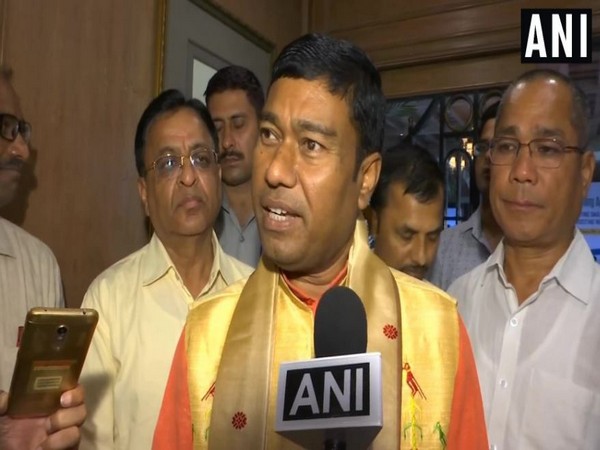Unemployment rate of graduate degree holders shows declining trend: Union Minister Rameswar Teli
As per the latest available Annual PLFS Reports, the estimated Unemployment Rate (UR) on usual status for graduate persons of age 15 years and above was 17.2 per cent, 15.5 per cent and 14.9 per cent during 2019-20, 2020-21 and 2021-22, respectively, which shows a declining trend in the unemployment rate of graduate degree holders.

- Country:
- India
Minister of State for Labour and Employment Rameswar Teli on Monday informed the Lok Sabha that the unemployment rate of graduate degree holders is declining as per Periodic Labour Force Survey data. Rameswar Teli said this in a written reply to a question in Lok Sabha.
The data on Employment and Unemployment is collected through the Periodic Labour Force Survey (PLFS) which is conducted by the Ministry of Statistics and Programme Implementation (MoSPI) since 2017-18. The survey period is July to June of next year. As per the latest available Annual PLFS Reports, the estimated Unemployment Rate (UR) on usual status for graduate persons of age 15 years and above was 17.2 per cent, 15.5 per cent and 14.9 per cent during 2019-20, 2020-21 and 2021-22, respectively, which shows a declining trend in the unemployment rate of graduate degree holders.
The Government is implementing the National Career Service (NCS) project to provide a variety of employment-related services like job search and matching, career counselling, vocational guidance, information on skill development courses etc. through a digital platform, added the Union Minister. Further, the Government has taken various steps to bridge the gap between skilled labour and employment. The Government has brought in National Education Policy (NEP) 2020 which aims to integrate vocational education programmes into mainstream education in all educational institutions in a phased manner. Beginning with vocational exposure at early ages in middle and secondary school, quality vocational education will be integrated smoothly into higher education.
The Aatmanirbhar Bharat Rojgar Yojana (ABRY) was launched with effect from October 1, 2020 to incentivize employers for creation of new employment and restoration of loss of employment during Covid-19 pandemic. The terminal date for registration of beneficiaries was 31.03.2022. Since inception of the scheme, till 11.03.2023, benefits of Rs 8805.0 crore have been provided to 60.3 lakhs beneficiaries, informed the government release. The Government is implementing the "Scheme for Higher Education Youth in Apprenticeship and Skills (SHREYAS)", a program conceived for students in degree courses, primarily non-technical, with a view to introduce employable skills into their learning, promote apprenticeship as integral to education and also amalgamate employment facilitating efforts of the education system so that clear pathways towards employment opportunities are available to students during and after their graduation.
To enhance the employability of the youth, the Ministry of Skill Development and Entrepreneurship (MSDE) is implementing the "National Apprenticeship Promotion Scheme (NAPS)" wherein the Government reimburses 25 per cent of the stipend payable to apprentices. The Ministry of Skill Development and Entrepreneurship (MSDE) delivers skill training through a comprehensive network of skill development centres/ institutes across the country under various schemes viz. Pradhan Mantri Kaushal Vikas Yojana (PMKVY), Jan Shikshan Sansthan (JSS) Scheme, National Apprenticeship Promotion Scheme (NAPS) and Craftsman Training Scheme (CTS) through Industrial Training Institutes (ITIs). Through these centres, training to candidates is imparted in employable skills, as per requirements of industry and economy.
The Government is implementing a programme for skilling of rural youth for entrepreneurship development through Rural Self Employment and Training Institutes (RSETIs). Besides these initiatives, various flagship programmes of the Government such as Make in India, Start-up India, Stand-up India, Digital India, Housing for All etc. are also oriented towards generating employment opportunities. All these initiatives are expected to collectively generate employment in the medium to long term through multiplier effects. (ANI)
(This story has not been edited by Devdiscourse staff and is auto-generated from a syndicated feed.)
- READ MORE ON:
- Lok Sabha
- Housing for All
- Periodic Labour Force Survey
- Jan Shikshan Sansthan
- Digital India
- Stand
- Scheme for Higher Education Youth
- Industrial Training Institutes
- 11.03.2023
- The Ministry of Skill Development
- Pradhan Mantri Kaushal Vikas Yojana
- Apprenticeship
- Yojana
- India
- Programme Implementation MoSPI
- Government
- National Education Policy
- ABRY
- The Aatmanirbhar Bharat Rojgar
- Entrepreneurship










